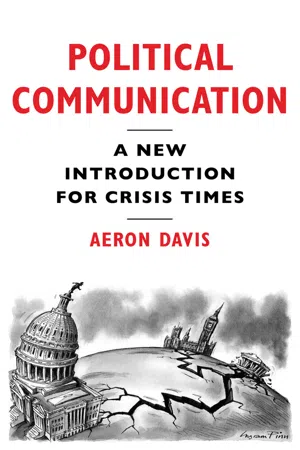The End of Old Certainties and Paradigms in Political Communication
They say that everyone remembered what they were doing the day John F. Kennedy was shot (22 November 1963). I wasn’t born yet but I do remember other such days: the day the Falklands/Malvinas conflict began (1982), images of the Berlin Wall being knocked down (1989), the multiple playbacks of two passenger airplanes crashing into New York’s Twin Towers (2001), the collapse of Lehman Brothers (2008), and the growing tide of protestors in Egypt’s Tahrir Square (2011). Each of these endlessly reported events left observers with a sense of shock and disbelief, and a feeling that things would never be the same again.
For me, as with many others, two such days stand out in 2016. The first was after the British went to the polls to vote on continuing membership of the European Union on 23 June. I woke up early in Amsterdam to get the result no one thought possible just a couple of months earlier. Geert Wilders was on the radio promising that the Dutch would soon follow the British out of the EU. No one in either the UK or continental Europe could predict what would follow. The second was the day US citizens voted for a new president on 8 November. I was chairing an event with Wolfgang Streeck on his new book (How Will Capitalism End?). He confidently predicted a Clinton victory to the three hundred or so in the audience, as had all but one of my one hundred students in the lecture hall the day before. Again, no one quite believed that the alternative of a Trump Presidency could ever happen. The same feelings of fear and the unknown quickly spread.
Both events did not simply produce freak outcomes. In multiple ways, they made the conventional wisdom about media and politics appear suddenly outdated. The large majority of academics, journalists, experts and pollsters all got it wrong. The winning campaigns tore up the tried and tested playbooks. The established parties were as much at war with each other as with their opponents. Electorates swung wildly and did not behave as they should. Mainstream media, now struggling for economic viability, was frequently distrusted or ignored by citizens. US and UK politics seemed to have suddenly fallen down a deep, dark rabbit hole.
The historical upheaval was not just an Anglo-American problem, to be linked to those nations’ neoliberal policy frameworks and first-past-the-post electoral systems. Countries across Europe, with different political and economic systems, were also throwing up erratic results. Parties that had dominated for decades were virtually wiped out. In 2015 the radical left party Syriza won power in Greece. In 2017, Macron’s fledgling En Marche! beat Marine Le Pen’s Front National, edging out France’s traditional main parties to win the Presidency in France. The 2018 Italian election resulted in a new governing coalition of the populist Northern League and Five Star Movement parties led by Giuseppe Conte, a lawyer without parliamentary experience. The Dutch and Germans experienced elections where mainstream parties lost substantial ground and took many months to form fragile, uneasy coalition governments. Far-right, populist and extremist parties have been on the rise across Europe, from the newer democracies of the East, to those seemingly more stable nations of Northern Europe and Scandinavia.
Change and uncertainty could be seen everywhere else too. In 2017, moves began for the impeachment of presidents in South Korea, Brazil and South Africa. In 2018, Lopez Obrador won the Presidency in Mexico with another fledgling party. Jair Bolsonaro, an extreme far-right politician, was victorious in the Brazilian presidential elections. Populist leaders consolidated their holds on power in Japan, Turkey, China, India and Russia. A new world order was emerging as US power waned. Other nations, notably China and Russia, who offered their own brand of authoritarian capitalism, began challenging the liberal cosmopolitan vision of globalization. Democracy watchers recorded clear democratic declines across the globe for the first time in decades.
It is these various signs of historical upheaval that have given me the impetus to write this book. In early 2016, having taught political communication for the best part of two decades, I felt confident in engaging with a clear set of theories and debates. Suddenly, as I began teaching the new cohort that Autumn, the discussions and arguments I had set out and participated in now appeared increasingly redundant. The subject text books, even recently published ones, looked to be describing a past era (my own included). Debates around professionalized parties set against ideologically driven ones now seemed less relevant after Donald Trump’s victory. Discussions of the steady mediatization of politics appeared confused when mass, legacy news outlets were going bust everywhere. Traditional media effects research looked redundant when so much of the population got their news in scraps from social media and elsewhere.
The lectures were packed with new students wanting to work out what was happening and where it was all leading. Each week, they and I began charting new territories, still unsure as to what the final destination looked like.
What was becoming clear was that several long...
